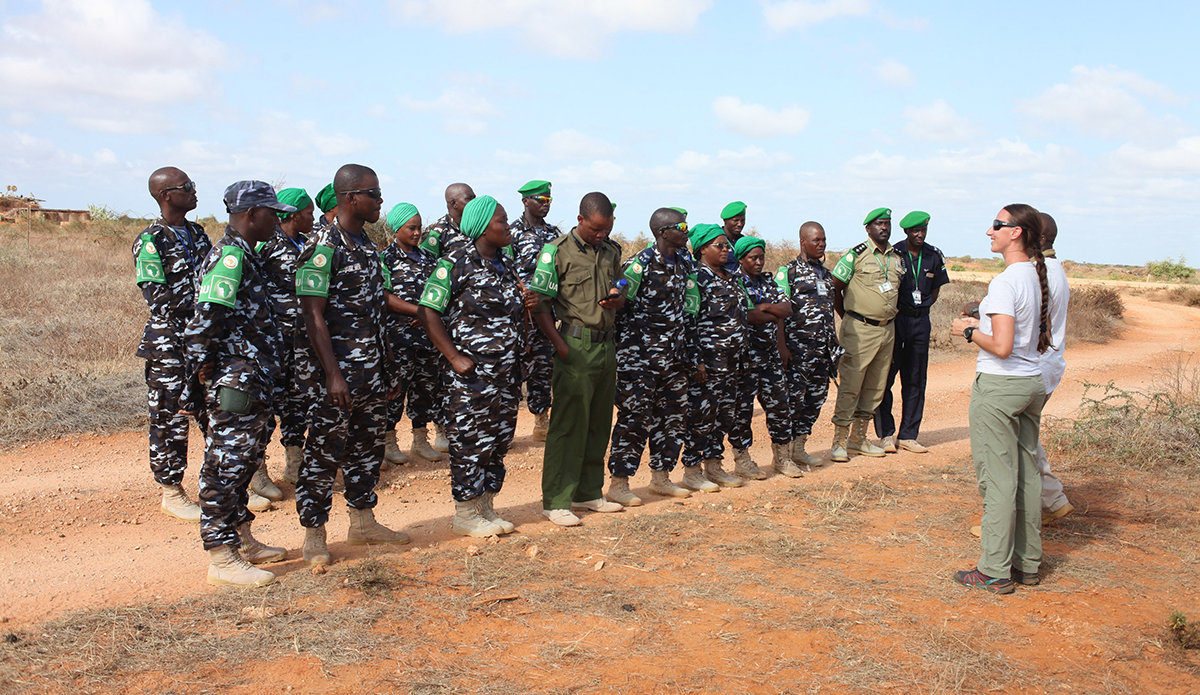SOMALIA — The landmark resolution on Women, Peace and Security in 2000, has made women participation in UN peace operation a priority. The United Nations Security Council Resolution (UNSCR) 1325, with its four pillars of Prevention, Participation, Protection, Relief and Recovery, has prioritized promotion of gender equality while also addressing the many challenges that women face in situations of conflict.
As a UN entity, UNMAS is committed to achieve gender equality and empowerment of women. A diverse workforce allows UNMAS to have coherence and multi-dimensional responses to the threat of explosive hazards.
In Somalia, UNMAS promotes gender equality using different approaches including strengthening managerial leadership and accountability. To this end, it is committed to mainstreaming gender in work structures, programmes and service delivery. It is also determined to attract more women in the fields of explosive hazard mitigations.
Women are also empowered in male dominated field such as EOD (Explosive Ordnance Disposal) and IEDD (Improvised Explosive Device Disposal). A big misconception people have is that women will take up lesser roles in the field, especially in Somalia, where the culture is more conservative. Sheree Ali and Aakriti Pandey have gone against this norm to become experienced EOD/IEDD trainers and mentors working to provide support to the African Union Mission in Somalia. They make important contributions to protect civilian lives and train the next generation of Somali armed forces.
Explosive hazard is a major challenge in Somalia. IEDs have become the number one weapon for armed groups in Somalia. On 14 October 2017, over 600 people were killed as the result of a massive IED attack at a busy intersection in Somalia. Aakriti and her colleagues find the provision of training military personnel in Somalia to mitigate against the threat of IEDs, as important and meaningful assignment.
“UNMAS programme in Somalia is unique from other programmes. We have specialized female trainers and mentors in EOD and IEDD working in the field and operations. This is very rare in the male dominated IEDD/EOD field. In addition, the programme director is also a woman.” Aakriti observed.
Aakriti works in technical operations related to explosive threat mitigation which include advising AMISOM and mentoring UNMAS staff in the field. She frequently travels to the sectors to enhance operational processes. Aakriti has extensive experience in security and humanitarian operations. A graduate from the prestigious Sandhurst Military Academy in England, she served in the Nepalese army as captain, serving in the UN missions in Chad and the Democratic Republic of Congo.
“It is inspiring to have an accomplished female colleague working with you and advising on operations”, said Sheree Ali, who works with UNMAS implementing partner SafeLane as an EOD and search mentor for the AMISOM troops in Kismayo. She trains AMISOM and Somali military personnel on explosive hazard awareness, search and other specialist courses.
Before coming to Somalia, Sheree served in the Corps of Royal Engineers in the British Army as a search instructor at the world class Defence EOD, Munitions and Search Training Regiment and previously as a member of the EOD and search taskforce, serving in operations in Afghanistan and Iraq.
“When I joined the military, women were not allowed in the infantry. I wanted to do a job that got me in the field and on the front line. I didn’t want to do a desk job so the option to be part of the royal engineers within EOD and search massively appealed to me” said Sheree.
Working in EOD, Search and IEDD is a tough domain. It requires mental and physical toughness. Often the search and disposal team work in front lines of military operations and in convoys. In a hostile environment like the one in Somalia, they act as protection against the threat of explosives on critical UN and local infrastructures.
Teaching lifesaving search skills is something Sheree continues to do in Somalia as part of UNMAS support to AMISOM. As a previous searcher, on Operation Herrick 17 in Afghanistan, her students like to hear from her previous military experience.
“The female students find it empowering to see a female trainer and mentor teaching them. I can talk to them from personal experience, especially when it comes to person search training. There is a difference in how you will search women and men and I can demonstrate this first hand.” Sheree adds.
Aakriti Pandey has observed from her experience working in different UN missions and the military that visible women participation in peacekeeping workforce empowers women and girls in host communities and it can foster women’s participation in local security forces, leading to improving the capability of local forces to take over security responsibilities from peacekeeping missions in the long term.
“I am proud to work in EOD/IEDD field, especially in Somalia. I feel accomplished every day. We make tangible differences against the threat of explosives. And it is inspiring to be surrounded by highly accomplished women like Sheree and our director.” Said Aakriti.

